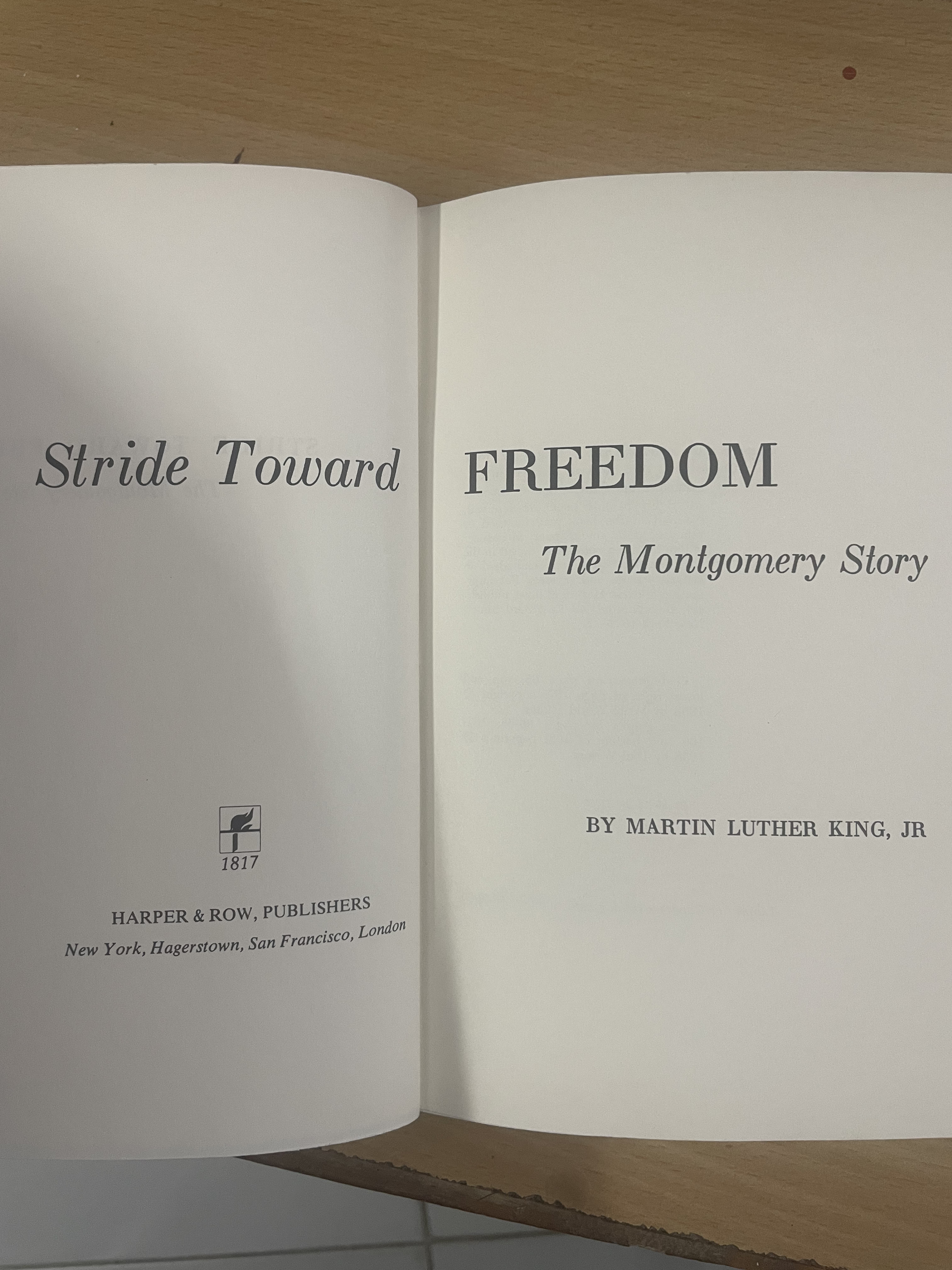Stride Toward Fredom The Montgomery Story

About
Summary
Exquisite
TOC
Details
Related
URL
Images
Overview
Stride Toward Freedom: The Montgomery Story, penned by Martin Luther King Jr., is a detailed, first-hand account of the 1955-1956 Montgomery bus boycott. Published in 1958, the book chronicles the events sparked by Rosa Parks' refusal to give up her seat on a segregated bus in Montgomery, Alabama, on December 1, 1955. King, a young pastor in Montgomery at the time, emerged as a leader of the boycott, providing leadership and direction to the movement. His book explores the boycott's planning, challenges, and the eventual desegregation of the Montgomery bus system.
Importance of Book
Firsthand Account: The book provides a firsthand account of the Montgomery bus boycott from one of its key leaders. King offers unique insights into the strategies, challenges, and experiences of the movement.
Philosophical Foundations: The book outlines King's philosophy of nonviolence, which became a guiding principle of the Civil Rights Movement.
Inspiration for Activism: Stride Toward Freedom inspired countless individuals to become involved in the struggle for civil rights. It demonstrated that ordinary people could bring about meaningful change through nonviolent action.
Historical Record: The book serves as a historical record of a pivotal moment in the Civil Rights Movement. It captures the atmosphere of the time, the key events, and the people who made the boycott possible.
Key Themes
Nonviolent Resistance: King outlines his understanding of nonviolence, which seeks to win an opponent to friendship, rather than to humiliate or defeat him. He emphasizes that the purpose of nonviolence is redemption and reconciliation, not defeat.
The Power of Collective Action: The Montgomery bus boycott demonstrated the power of collective action in bringing about social change. King illustrates how 50,000 African Americans united to challenge segregation and demand equal rights.
Faith and Spirituality: King's faith and spirituality played a central role in the boycott. He describes a moment of epiphany where he realized he could not face the challenges alone and sought guidance from God.
The Importance of Leadership: King's leadership was instrumental in the success of the boycott. His ability to inspire, organize, and mobilize the African American community helped sustain the movement despite the difficulties.
The Struggle for Racial Justice: The book vividly portrays the conditions of African Americans living in Alabama during the era of segregation. King highlights the injustices and indignities they faced daily, including discrimination, inequality, and violence.
Cultural Significance
Contribution to the Civil Rights Movement: The book contributed to the growing momentum of the Civil Rights Movement. It helped to raise awareness of the injustices faced by African Americans and to mobilize support for change.
Impact on American Society: The Montgomery bus boycott, as detailed in Stride Toward Freedom, had a profound impact on American society. It challenged segregation and discrimination in the South and paved the way for future civil rights reforms.
Influence on Social Justice Movements: King's philosophy of nonviolence, as articulated in the book, has influenced social justice movements around the world. His teachings have inspired activists to use nonviolent tactics to challenge oppression and injustice.
Legacy of Martin Luther King Jr.: The book is an important part of the legacy of Martin Luther King Jr., one of the most important figures in American history. It showcases his leadership, his vision, and his commitment to social justice.
Effects on Society
Desegregation of Public Transportation: The Montgomery bus boycott led to the desegregation of public transportation in Montgomery and, eventually, throughout the South.
Advancement of Civil Rights Legislation: The boycott and the Civil Rights Movement helped create a climate that made it possible to pass landmark civil rights legislation, such as the Civil Rights Act of 1964 and the Voting Rights Act of 1965.
Empowerment of African Americans: The Montgomery bus boycott empowered African Americans to stand up for their rights and to demand equal treatment. It fostered a sense of community and pride and gave them a voice in the political process.
Transformation of American Values: The Civil Rights Movement, inspired in part by Stride Toward Freedom, helped to transform American values and attitudes toward race and equality. It challenged deeply ingrained prejudices and promoted a more inclusive vision of American society.
Conclusion
Stride Toward Freedom: The Montgomery Story remains a powerful and important book. It offers insight into the Montgomery bus boycott, the philosophy of Martin Luther King Jr., and the struggle for civil rights in America. Its impact on the country and society is undeniable, and its message of nonviolence, justice, and equality continues to inspire people around the world.
Title
Stride Toward Fredom The Montgomery Story
Author
Martin Luther King Jr
Name of Publisher
Harper & Row Publishers New York Hangerstown San Francisco London
Publish Date
1958
Subject
Stride Toward Freedom is both a historical account and a personal reflection by Martin Luther King Jr
Vintage
1948-2000
Number of Pages
230
Category
Literary
Sub Category
Social Sciences
Rarity
RARE
